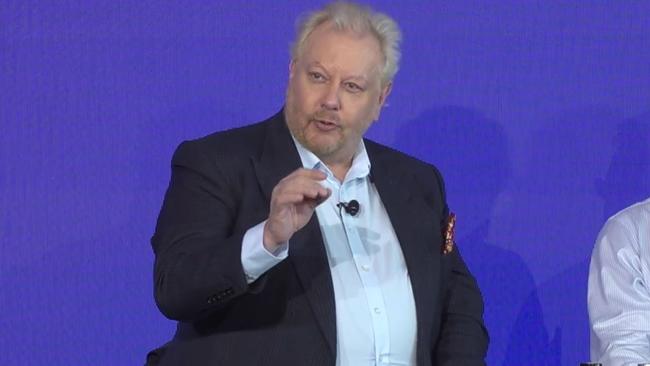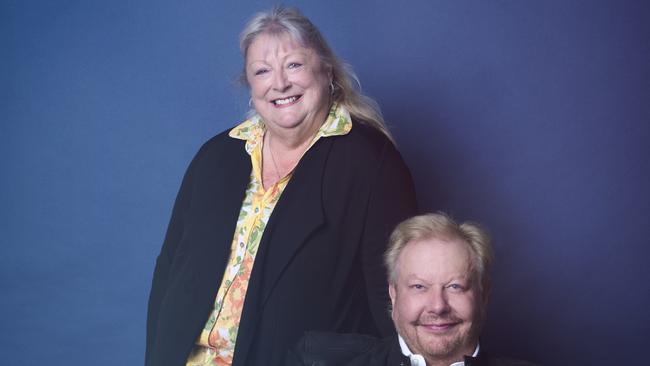Richard White crowns himself WiseTech’s chief innovation officer as CEO search delayed
The scandal-plagued billionaire has appointed himself to a new executive role and signed a deal to stay at WiseTech until he is 80.

Business
Don't miss out on the headlines from Business. Followed categories will be added to My News.
One of WiseTech’s biggest external shareholders has called for more independent directors on its board after founder Richard White appointed himself to a new executive role and said he would lead the search for a new CEO at the scandal-plagued logistics titan.
Mr White crowned himself WiseTech’s new chief innovation officer in addition to his role as executive chairman on Wednesday. The company said it also expected to appoint a new CEO in November – 12 months after Mr White was forced to stand down from the role.
But Debbie Blakey – chief executive of HESTA, which owns about 0.6 per cent of WiseTech – questioned the independence of the company’s board, particularly as Mr White becomes more intertwined in executive and boardroom roles.
Australia’s peak shareholder lobby group also blasted the move, saying WiseTech was “not operating as we would expect an ASX-listed company to operate”, expressing concerns about its corporate governance and the failure to solve its “key man risk” around Mr White, who founded the technology company with Maree Isaacs in 1994.
“HESTA remains focused on the need for WiseTech to appoint a majority independent board. The appointment of additional independent directors has become more important with Mr White holding both executive and board positions,” Ms Blakey said.
“Progress towards the appointment of an experienced CEO, backed by a strong management team, is critical to provide investors with confidence that the company has a stable team to execute its long-term strategy. We also continue to seek meaningful action in response to the findings of its board-commissioned reviews.”
WiseTech has finally entered into a new 10-year employment agreement — including a further five-year extension option — with Mr White, who owns about 37 per cent of the company.
He resigned as CEO and a director late last year following a series of sensational allegations, including that he exchanged business advice for sex, and moved into a $1m a year consulting role. The new position prompted led to a boardroom exodus, with former chair Richard Dammery quitting the company with three other directors in February.
This paved the way for Mr White’s comeback, who announced himself as executive chairman and now chief innovation officer
He will be 80 when it expires and will now lead the search for a new CEO and has also hired new direct reports.

Former WiseTech staffer Zubin Appoo, who left the company in 2018, will return as chief of staff and deputy chief innovation officer, reporting directly to Mr White.
“My return to employment at WiseTech as executive chair and chief innovation officer reflects my long-term commitment to continuing WiseTech’s track record of delivering strong shareholder returns,” Mr White said.
“I am focused on implementing WiseTech’s product-led innovation strategy and ensuring we have a strong succession plan in place to maintain our growth momentum. I am confident of WiseTech’s future growth prospects, our ability to execute our strategy and the strength of our high calibre senior leadership team.”
But a permanent CEO is yet to be appointed, with chief financial officer Andrew Cartledge acting in the role for the past six months after cancelling his retirement plans.
“The company has progressed its search for a permanent chief executive officer. Several strong internal and external candidates have been identified for the role,” WiseTech told the ASX.
“A shortlist is in the process of being finalised, with an appointment anticipated to be announced to the market prior to the Annual General Meeting in November 2025.”
Australian Shareholders Association CEO Rachel Waterhouse said that WiseTech was not operating like an ASX-listed company, expressing concerns about its corporate governance.
“We don’t support executive chair roles. There is not enough independence on the board. The CEO search is taking a significant period of time. It leads to still uncertainty around the company, but also the key person risk still remains,” Ms Waterhouse said.
“We’ve raised governance concerns (with WiseTech) and it’s not operating as we would expect an ASX-listed company to operate. With that executive chair role, with such a focus on one person, the key person risk and no real independent directors on the board, there’s quite a lot to be done.”
WiseTech shares have dived more than 35 per cent in the past six months. On Wednesday they lost 1.2 per cent to $83.83, while the broader market was steady.
AustralianSuper – formerly WiseTech’s second-biggest outside investor – sold its $580m stake last month, saying it could not get sufficient comfort around its governance.
“We have sold because recent developments have not met our expectations. We may reconsider our position should circumstances change,” said Shaun Manuell, the fund’s head of domestic equities.
A board subcommittee, comprising Ms Isaacs, Charles Gibbon and lead independent director and former 16-year board veteran Michael Gregg, “acknowledges the legitimate governance concerns raised in the board review findings”.
The independent review found that Mr White misled the board about his personal relationship with an employee. But it has refused to release the entire findings of the investigation.
The Australian Shareholders’ Association called on the logistics software giant to reconsider its position, warning that “partial disclosures create uncertainty and undermine shareholder trust”.
“The review confirms the CEO failed to disclose a personal relationship with an employee to the board, raising serious governance concerns,” said ASA CEO Rachel Waterhouse said last month.
WiseTech has since appointed former chair Andrew Harrison as an “independent” director, attracting criticism from the ASA.
But Mr White has attracted support from fellow tech entrepreneur Adrian Di Marco, who founded ASX-listed TechnologyOne. Mr Di Marco also criticised the independent directors who resigned, saying they should have stayed until the end of their term.
“Now let’s put his (Mr White’s) personal life aside. You could have said, ‘Look, we have a disagreement with Richard, OK, and we’re working through that disagreement’,” Mr Di Marco said.
“They should have stayed to the end of their term and then maybe not stood up for re-election and allowed the company to smoothly transition to a new business model, into a new operating model, and give time for the company to explain the operating model and shareholders not to be panicked.”
Under the terms of Mr White’s new employment agreement his focus will be on delivering WiseTech’s product road map; innovation and software development; commercialisation of new products; Strategy development and implementation including identifying and pursuing growth initiatives and identifying initiatives and overseeing the implementation of initiatives that “generate customer and shareholder value”.
More Coverage
Originally published as Richard White crowns himself WiseTech’s chief innovation officer as CEO search delayed





